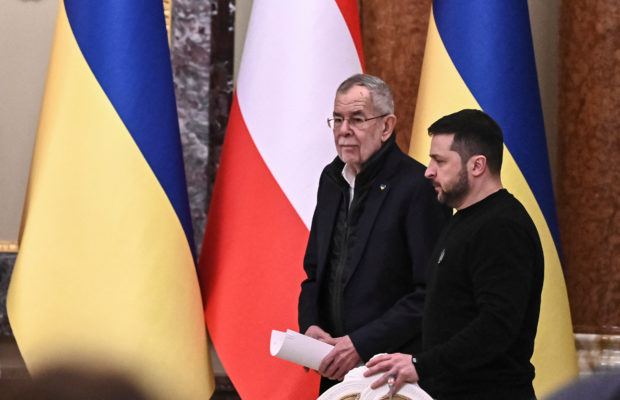Factbox: How long will it take Ukraine to join EU?

Ukraine’s President Volodymyr Zelenskiy and Austrian President Alexander Van der Bellen arrive at a joint news briefing, amid Russia’s attack on Ukraine, in Kyiv, Ukraine February 1, 2023. REUTERS
More than a dozen top European Union officials arrive in Kyiv on Thursday, a top-level demonstration of support following new pledges of military aid as the first anniversary of Russia’s invasion of Ukraine nears.
While the EU backs Ukraine and supports democratic and economic reforms there, Kyiv’s hopes to quickly join the 27-nation EU are set to be dashed.
Here is why – and details about EU accession:
* Prime Minister Denys Shmyhal has said he wanted Ukraine to join the European Union in two years and a liberal Belgian EU lawmaker said teasingly he dreamt of it happening over the next five. In reality, that is most likely to take much longer.
The last country to have joined the EU was Croatia in 2013, a decade after formally applying. Ukraine’s neighbor Poland took 20 years until joining in 2004.
Article continues after this advertisementUkraine applied to join shortly after the Feb. 24, 2022, invasion and last June received a formal candidate status from the EU, which cast it as a bold geo-political move.
Article continues after this advertisement* To be allowed in, Ukraine needs to fulfill extensive criteria from political stability including democratic institutions guaranteeing the respect of the rule of law and human rights to economic ability to withstand more competition.
Ukraine will have to transpose its national law to extensive EU legal standards from climate to labor to health, among others.
While the bloc recognizes progress so far, it stresses Ukraine needs to do more to build a credible track-record of fighting endemic corruption.
Beyond that, the EU highlights reforms necessary to ensure that courts are free from political meddling and the rights of minorities respected in Ukraine.
* Accession criteria do not specifically say a country at war cannot become an EU member but the bloc does not want to import territorial conflicts. It did, however, allow Cyprus to join in 2004 despite Nicosia not controlling the whole island since Turkey’s 1974 invasion.
Turkey, a NATO ally, has seen its own EU membership negotiations unravel in recent years as President Tayyip Erdogan’s crackdown on critics following an attempted coup in 2016 undermined democracy there and soured ties with the bloc.
The negotiations started in 2005 after decades of Turkey seeking a formal start to an EU membership bid, dovetailed with Erdogan’s first economic reforms in power as prime minister from 2003 that made Ankara an important emerging market economy and trade partner.
* All EU countries must agree to take a new peer in. Beyond Ukraine meeting the complex criteria, it would also have to overcome reluctance from several founding states including France and the Netherlands to expand the bloc more to the east.
EU enlargement talks have stalled since 2018 as the current members cannot agree whether to admit other official candidates Albania, North Macedonia, Moldova, Montenegro and Serbia.
The bloc is also divided on awarding formal candidate status to other hopefuls Bosnia and Herzegovina, Kosovo and Georgia.
With some 44 million people, Ukraine would be the fifth-biggest EU country after Germany, France, Italy and Spain, giving it large influence on the bloc’s decisions.